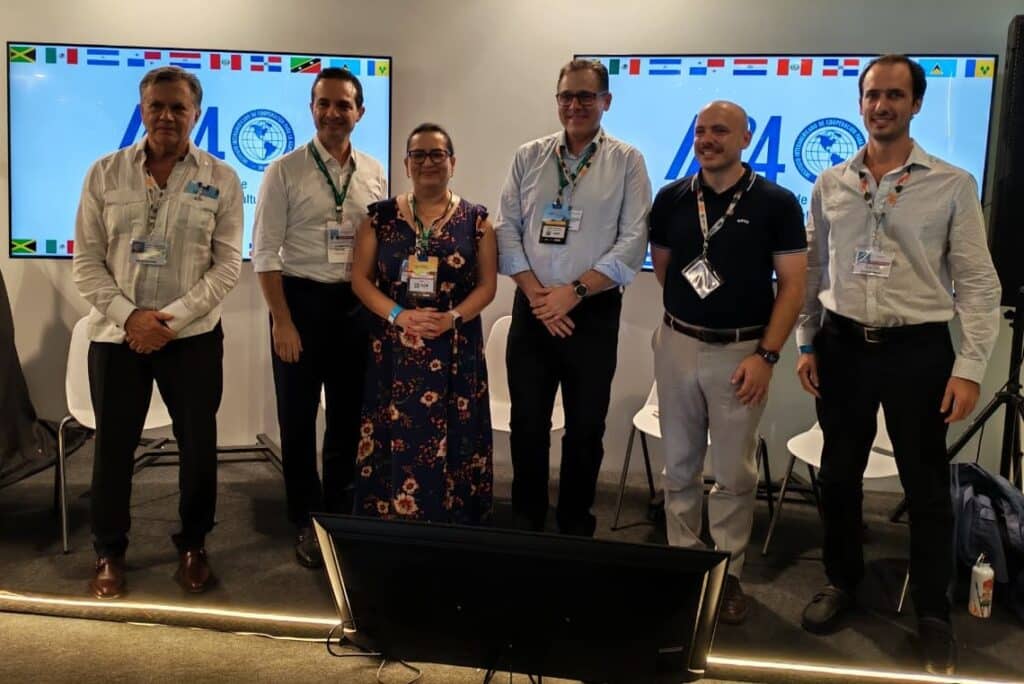
Belém do Pará, Brazil, 21 November 2025 (IICA) – Agriculture in the Americas reported at COP30 on the successful results it has been achieving in the production of sustainable fuels, and showcased its potential to lead a true revolution in the coming decade that would contribute to the decarbonization of land, sea and air transport.
The Director General of the Inter-American Institute for Cooperation on Agriculture (IICA), Manuel Otero, stressed that the expansion of sustainable fuels made from agricultural raw materials is on the Institute’s institutional agenda as a ministerial mandate, recently reaffirmed by the Ministers of Agriculture gathered at the Inter-American Board of Agriculture (IABA), which met in Brasilia at the beginning of the month.
At the conference in Belém do Pará—where the world is discussing how to address climate challenges and their economic and social implications—the host country, Brazil, is driving the “Belém Commitment for Sustainable Fuels” (Belém 4x), aimed at providing political support and fostering international cooperation to at least quadruple the use of sustainable fuels by 2035.
Along these lines, IICA’s international specialist in biofuels and renewable energy, Agustín Torroba, presented at the COP in the Brazilian Amazon the main conclusions of the policy brief prepared by IICA and CPBIO, titled “Action Framework for Belém 4x: Doubling Liquid Biofuel Production Without Additional Hectares: Productivity, Sustainability, and Affordability”.
This document proposes an action framework enabling countries to double the production of liquid biofuels without expanding the agricultural frontier, based on improvements in productivity, industrial efficiency and robust, harmonized sustainability frameworks.
IICA serves as the technical secretariat of the Pan-American Coalition on Liquid Biofuels (CPBIO), which brings together 25 organizations from 15 countries in Latin America and the Caribbean involved in the production of sustainable fuels from agricultural raw materials.
Torroba is taking part in Belém do Pará in various high-level debates on the role of biofuels in the energy transition, where he emphasized that meeting the Belém 4x Commitment will only be possible if the links between agriculture, energy and the environment are strengthened, making agricultural productivity and sustainability the pillars of sustainable-fuel expansion.
Turning point
As stated at the IICA pavilion at COP30 by Evandro Gussi, CEO of the Brazilian Sugarcane and Bioenergy Industry Association (UNICA), the biofuels industry is experiencing a turning point. “Biofuels will play a fundamental role over the next ten years in many parts of the world. Notice that in Europe, until recently, they spoke only of transport electrification, and now they are again talking about combustion—but with sustainable fuels”, he added.
Gussi said that Brazil became a global power in sustainable biofuels—economically, socially and environmentally—thanks to public policies grounded in science, and that it is ready to share the lessons learned with other countries in Latin America. “Brazil’s model is exportable and replicable in other parts of the world”, he said.
Roberto Matarazzo Braun, Director of ESG and Corporate Communication at Toyota Brazil, explained the specific features of each regional market in which the brand operates.
“For years, the automotive industry has been working on the development of new technologies and on the use of more sustainable fuels to reduce carbon emissions into the atmosphere. And we are convinced that a single technology cannot be chosen for the entire world. Each region has unique market needs and, in turn, a different situation regarding renewable energy. We must offer diverse mobility options. There are many pathways to carbon neutrality”, he said.
In that regard, he described the scenario in Brazil, the world’s second-largest producer and owner of a national distribution infrastructure that is ready for use.
“For Brazil, the best option is ethanol, with which it already has 50 years of experience. Today Brazil is the world’s leading player in sustainable mobility with biofuels. In the same way, many other countries can make progress in biofuels based on sugarcane, corn or other products for ethanol production. To decarbonize, all technologies must be available. And biofuels are a realistic and immediate solution, especially in countries of the Global South”, he concluded.
Pedro de la Fuente, Senior Manager for External Affairs & Sustainability for the Americas at the International Air Transport Association (IATA), spoke about the technological pathways for producing sustainable aviation fuels (SAF) and the challenges of accelerating SAF production on the basis of public policies and sustainability frameworks with harmonized criteria.
Aida Lorenzo de Juárez, High-Level Climate Champion for Sustainable Bioenergy and Executive Director of the Renewable Fuels Association of Guatemala, moderated the panel and highlighted the leap being taken in decarbonization through liquid biofuels from land transport to maritime and air transport.
Technology and strategy for the energy transition
Torroba emphasized that the key lies in closing yield gaps for the main crops used for biofuels—corn, sugarcane, wheat, soy, palm and rapeseed—to ensure abundant, sustainable and cost-effective raw materials, rather than relying solely on alternative raw materials that are still immature. By improving productivity, the same hectare can provide more food, more fiber and more renewable energy, avoiding additional pressure on ecosystems.
The CPBIO Executive Secretary also stressed that biofuels can become a simultaneous source of food security (providing food and protein-rich co-products for human and animal nutrition), environmental security (reducing greenhouse gas emissions compared to fossil fuels) and energy security (diversifying the energy mix and reducing dependence on oil).
More information:
Institutional Communication Division.
comunicacion.institucional@iica.int











